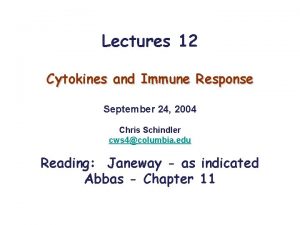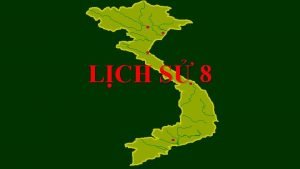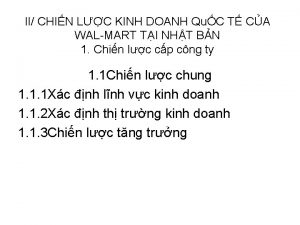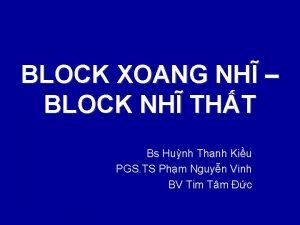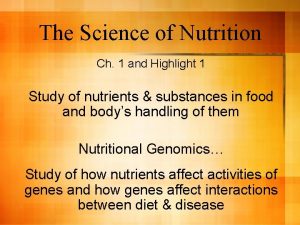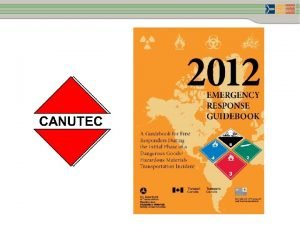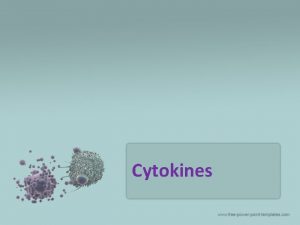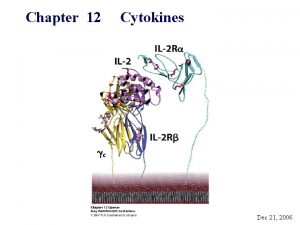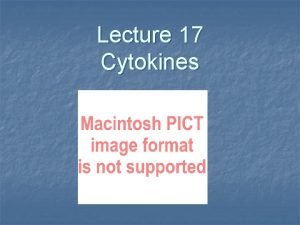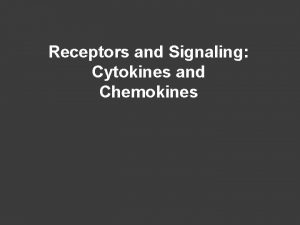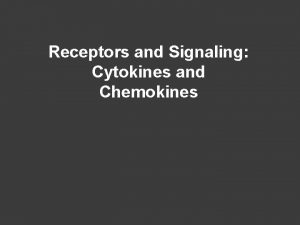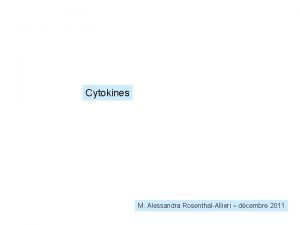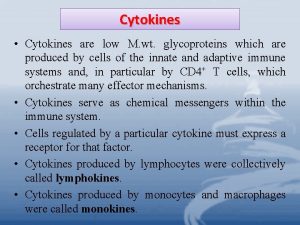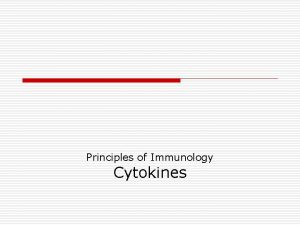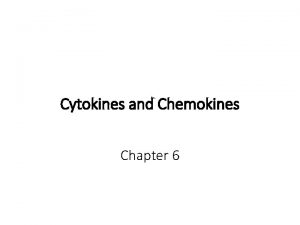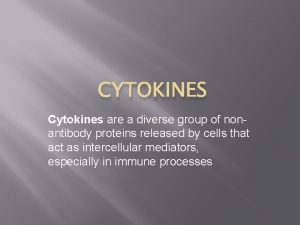Cytokines To highlight the major cytokines that are














- Slides: 14

Cytokines To highlight the major cytokines that are mediators of: (i) natural immunity, (ii) adaptive immunity and (iii) hematopoesis.

Overview Cytokines were initially identified as products of immune cells that act as mediators and regulators of immune processes. However, many cytokines are now known to be produced by cells other than immune cells and they can have effects on non-immune cells as well. q Cytokines are a diverse group of non-antibody proteins that act as mediators between cells. Cytokines are currently being used clinically as biological response modifiers for the treatment of various disorders. Other terms that are commonly used to describe particular kinds of cytokines, include: 1) monokines, cytokines produced by mononuclear phagocytic cells; 2) lymphokines, cytokines produced by activated lymphocytes, especially Th cells; and 3) interleukins, cytokines that act as mediators between leukocytes

q Cytokines are not typically stored as preformed proteins. Rather their synthesis is initiated by gene transcription and their m. RNAs are short lived. They are produced as needed in immune responses. q Many individual cytokines are produced by many cell types and act on many cell types (i. e. , they are pleotropic) and in many cases cytokines have similar actions (i. e. , they are redundant). Redundancy is due to the nature of the cytokine receptors. Receptors for cytokines are heterodimers (sometimes heterotrimers) that can be grouped into families in which one subunit is common to all members of a given family. Receptors for various cytokines.

A receptor for one cytokine can often respond to another cytokine in the same family. Thus, an individual lacking IL-2, for example, is not adversely affected because other cytokines (IL-15, IL-7, IL-9, etc. ) assume its function. Similarly, a mutation in a cytokine receptor subunit other than the one in common often has little effect. On the other hand, a mutation in the common subunit has profound effects. Example: a mutation in the gene for the IL-2 R gamma subunit causes human X-linked severe combined immunodeficiency (XSCID) characterized by a complete or nearly complete T and B cell defects.

One cytokine often influences the synthesis of other cytokines. They can produce cascades, or enhance or suppress production of other cytokines. They can often influence the action of other cytokines. The effects can be: 1) antagonistic; 2) additive; or 3) synergistic. Cytokines bind to specific receptors on target cells with high affinity and the cells that respond to a cytokine are either: 1) the same cell that secreted cytokine (autocrine); 2) a nearby cell (paracrine) or 3) a distant cell reached through the circulation (endocrine). Cellular responses to cytokines are generally slow (hours) because they require new m. RNA and protein synthesis.

II. Categories of Cytokines can be grouped into different categories based on their functions or their source A. Mediators of natural immunity – Cytokines that play a major role in the innate immune system include: TNF-α, IL-10, IL-12, type I interferons (IFN-α and IFN-β), IFN-γ, and chemokines. 1. TNF-α – q Tumor necrosis factor alpha is produced by activated macrophages is response to microbes, especially the lipopolysaccharide (LPS) of Gram negative bacteria. q It is an important mediator of acute inflammation. q It mediates the recruitment of neutrophils and macrophages to sites of infection by stimulating endothelial cells to produce adhesion molecules and by producing chemokines which are chemotactic cytokines. q It also acts on the hypothalamus to produce fever and it promotes the

2. IL-1 – q Interleukin 1 is another inflammatory cytokine produced by activated macrophages. q Its effects are similar to that of TNF-α and it also helps to activate T cells. 3. IL-10 – q Interleukin 10 is produced by activated macrophages and Th 2 cells. q It is predominantly an inhibitory cytokine. It inhibits production of IFN-γ by Th 1 cells, which shifts immune responses toward a Th 2 type. q It also inhibits cytokine production by activated macrophages and the expression of class II MHC and co-stimulatory molecules on macrophages, resulting in a dampening of immune responses. 4. IL-12 – q Interleukin 12 is produced by activated macrophages and dendritic cells. q It stimulates the production of IFN-γ and induces the differentiation of Th cells to become Th 1 cells. In addition, it enhances the cytolytic

5. Type I interferons – Type I interferons (IFN-α and IFN-β) are produced by many cell types and they function to inhibit viral replication in cells. q They also increase expression of class I MHC molecules on cells making them more susceptible to killing by CTLs. q Type I interferons also activate NK cells. q 6. Chemokines – q Chemokines are chemotactic cytokines produced by many kinds of leukocytes and other cell types. q They represent a large family of molecules that function to recruit leukocytes to sites of infection and play a role in lymphocyte trafficking

5. INF-γ – Interferon gamma is an important cytokine produced primarily by Th 1 cells, q It can also be produced by Tc and NK cells to a lesser extent. q It has numerous functions in both the innate and adaptive immune systems. q Functions of IFN-γ.

B. Mediators of adaptive immunity – Cytokines that play a major role in the adaptive immune system include: IL-2, IL-4, IL-5, TGF-β, IL-10 and IFN-γ. 1. IL-2 – q Interleukin 2 is produced by Th cells, although it can also be produced by Tc cells to a lesser extent. q It is the major growth factor for T cells. q It also promotes the growth of B cells and can activate NKcells and monocytes. Immuno-regulatory actions of interleukin-2

IL-2 acts on T cells in an autocrine fashion. q Activation of T cells results in expression of IL-2 R and the production of IL-2. q The IL-2 binds to the IL-R and promotes cell division. q When the T cells are no longer being stimulated by antigen, the IL 2 R will eventually decay and the proliferative phase ends. q Stimulation of T cell proliferation by IL-2.

2. IL-4 – q Interleukin 4 is produced by macrophages and Th 2 cells. q It stimulates the development of Th 2 cells from naïve Th cells and it promotes the growth of differentiated Th 2 cells resulting in the production of an antibody response. q It also stimulates Ig class switching to the Ig. E isotype. 3. IL-5 – q Interleukin 5 is produced by Th 2 cells q It functions to promote the growth and differentiation of B cells and eosinophiles. q It also activates mature eosinophiles. 4. TGF-β – q Transforming growth factor beta is produced by T cells and many other cell types. q It is primarily an inhibitory cytokine. q It inhibits the proliferation of T cells and the activation of macrophages. q It also acts on PMNs and endothelial cells to block the effects of pro-inflammatory cytokines.

C. Stimulators of hematopoesis – q Some cytokines stimulate the differentiation of hematopoetic cells. q These include GM-CSF – promotes the differentiation of bone marrow progenitors. M-CSF – promotes growth and differentiation of progenitors into monocytes and macrophages. G-CSF – promotes production of PMNs.

Cytokine Networks Production and action of cytokines on cells of the immune system q Many of them have effects on other cells and organ systems. q Some of the interactions in the cytokine network
 Antigentest åre
Antigentest åre Examples of cytokines
Examples of cytokines Thơ thất ngôn tứ tuyệt đường luật
Thơ thất ngôn tứ tuyệt đường luật Hãy nói thật ít để làm được nhiều
Hãy nói thật ít để làm được nhiều Thơ thất ngôn tứ tuyệt đường luật
Thơ thất ngôn tứ tuyệt đường luật Tôn thất thuyết là ai
Tôn thất thuyết là ai Ngoại tâm thu thất chùm đôi
Ngoại tâm thu thất chùm đôi Walmart thất bại ở nhật
Walmart thất bại ở nhật Gây tê cơ vuông thắt lưng
Gây tê cơ vuông thắt lưng Block nhĩ thất độ 1
Block nhĩ thất độ 1 Tìm vết của mặt phẳng
Tìm vết của mặt phẳng Sau thất bại ở hồ điển triệt
Sau thất bại ở hồ điển triệt Fog bias vray
Fog bias vray Highlight ch 1
Highlight ch 1 Use guide 111 in the erg
Use guide 111 in the erg

